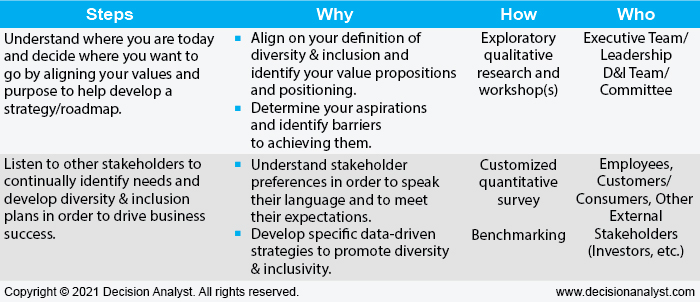Listen More, Plan Better: Searching For Authenticity In Environmental, Social, And Corporate Governance (ESG) Planning
by Sara Sutton and Mai Tolentino
-
Environmental, social, and corporate governance (ESG) issues have been at the forefront of the news in recent times.
With environmental consciousness rising, social movements finding greater audiences, and corporate boards being held more accountable for how businesses are run, assessing, planning, and enacting new policies for ESG issues has become increasingly important.
For purposes of this discussion, we will touch on both the social and corporate governance aspects of ESG, owing to the heightened expectation for companies to include socially responsible programs like diversity & inclusion in their policies and messages. In the past year or two, the widespread protests that have swept across the country have brought vital and urgent conversations about inequities into the national consciousness. As conversations continue, so too should prioritization of addressing these issues in the business world. Many major companies have taken the first step of fostering inclusive environments and have embraced diversity in different ways. How can other organizations, then, follow suit and ensure they excel in developing their own diversity & inclusion strategies?
First, let’s define what diversity & inclusion mean and why they’re important for organizations. The dictionary defines diversity as “the practice or quality of including or involving people from a range of different social and ethnic backgrounds and of different genders, sexual orientations, etc.” The key word is “different” – and not just differences in gender, race, or sexual orientation, but also in religion, age, culture, socioeconomic background, and disabilities, because all of these things contribute to an individual’s unique life experience.
Since there’s no single image of what a “typical” customer (or employee) looks like, it’s important to include a wide range of individuals in business decision-making processes. Studies have proven that a diverse workforce can develop better products, drive market growth, and enable the adaptability that innovation requires, all of which lead to improved financial performance.
Diversity & inclusion are also increasingly expected, meaning that the lack thereof can be seen as a gaping hole in a company’s policies. For instance, Gen Z (born between 1995 and 2012) currently makes up about a quarter of the population, outnumbering Gen X or Gen Y/Millennials. Gen Z is about to enter the workforce, bringing enormous spending power with them, meaning that their preferences will begin driving the economies of the world more and more. This generation is the most ethnically and racially diverse generation in history, and they have nontraditional views on gender and identity. They have high expectations of corporations to authentically support diversity & inclusion.
Now, more than ever, corporations need to reduce barriers to the inclusion of underrepresented people, not only to resonate with the powerful and upcoming Gen Z and to be better citizens of the world, but also to make good business sense and drive business success. So, how can companies ensure equitable insights and authentic initiatives? Below are a few steps that will lead to success, including how market research can support this effort:

Although previously left to the C-suite or board alone, the spotlight on ESG in the past few years now means that including a wider range of stakeholders in the planning process is the gold standard. Well-planned market research can help you to understand internal (employee) and external (customer/consumer) stakeholder wants and needs, align company planning with market needs, and increase the likelihood of market success. Using market research to prioritize ESG issues, including diversity & inclusion, is critical to helping businesses prioritize changes that are needed to ensure long-term success in a growing and changing world.
Contact Decision Analyst
For questions about this article please email Bonnie Janzen, Executive Vice President (bjanzen@decisionanalyst.com) or call 1-800-262-5974 or 1-817-640-6166.
Copyright © 2021 by Decision Analyst, Inc.
This posting may not be copied, published, or used in any way without written permission of Decision Analyst.


